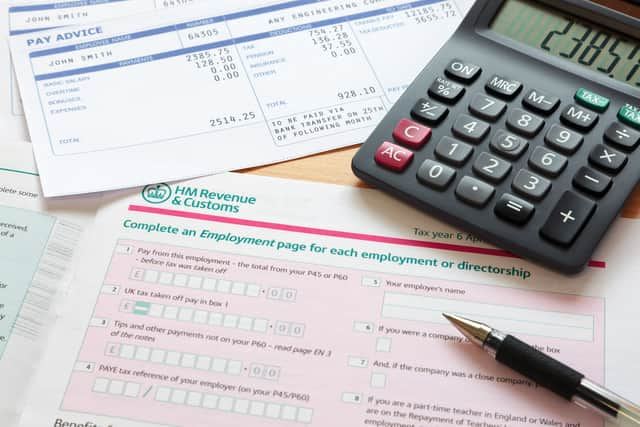What is income tax? UK rise and 2023/24 rates explained - who pays 45p rate and how personal allowance works
This article contains affiliate links. We may earn a small commission on items purchased through this article, but that does not affect our editorial judgement.
and live on Freeview channel 276
Income tax went up for workers across the UK when the new tax year came in on 6 April.
Chancellor of the Exchequer Jeremy Huntannounced a band freeze in his Autumn Statement in November 2022. It has been described as a stealth tax hike given wages are increasing numerically (although they are falling in real terms due to record inflation).
Research by think tank the Institute for Fiscal Studies has said the move will mean 20% of taxpayers will be paying the higher rate by 2027. Currently, only 11% of workers are paying the upper rate.
It comes as the government has increased the UK’s tax burden to record levels. Rishi Sunak and Jeremy Hunt have done so as part of a bid to improve the UK’s public finances after the Liz Truss Mini Budget in September 2022.
But their policy direction has coincided with the worst cost of living crisis for decades. Analysis by the Resolution Foundation think tank in the wake of the Spring Budget 2023 shows UK households will be paying an extra £4,200 in tax on average by the 2027/28 financial year compared to before the pandemic. At the same time, typical disposable incomes per household will remain lower than pre-Covid times over this period, and even £1,800 down on where they would have been had the anaemic growth of the 2010s continued.
So, how has income tax changed - and why does it mean you will be paying more to the Treasury?
What is income tax?
Income tax is a tax every working person in the UK has to pay, so long as they earn an annual salary above a certain threshold. What you pay depends on how much you earn.


In England, Wales and Northern Ireland, income tax is currently split into four different bands: personal allowance (0%), basic rate (20%), higher rate (40%) and top rate (45%).
The rate you pay depends on how much of your income falls into each band. Those on the top rate do not get any personal allowance (i.e. the first £12,570 they earn is taxed).
The top rate of the tax is also known as the ‘45p rate’ as earnings above the threshold are taxed at 45p for every pound over the limit. The bands differ in Scotland, which has a starter rate of 19% and an intermediate rate of 21%. Its higher rate is 42% and its top rate is 47%.
According to the OBR, income tax generated an estimated £213.2 billion for the public purse in the 2021/22 financial year. This figure was almost a quarter (24.7%) of the Treasury’s annual income from taxes.
How did income tax rise?
In the Autumn Statement, Jeremy Hunt announced he would be freezing income tax bands for regular earners and exposing more higher earners to the top rate of the tax.
Freezing the thresholds is an effective tax hike. Wages are still growing on average - albeit at a rate that’s well-below the rate of inflation, which means we’re all seeing a fall in our real-terms income. According to data from the Office for National Statistics (ONS), private sector pay grew 7% while public sector salaries only went up 4.8% over the three months from November 2022 to January 2023. During this period, inflation remained above 10%, with the ONS estimating overall real-terms pay fell back 3.2%.
The OBR has said that the threshold freeze will amount to a 4p income tax hike in every pound for UK workers. Meanwhile, analysis by The Times suggests another 3.2 million people will end up paying income tax as a result of the policy.


As well as keeping the bands where they are, Jeremy Hunt also cut the top rate threshold in his Autumn Statement. As of April 2023, the 45p rate applies to those earning £125,140 and above rather than £150,000 and above. It means the bands look like this in all parts of the UK (barring Scotland):
- Personal Allowance - Up to £12,570 - 0%
- Basic rate - £12,571 to £50,270 - 20%
- Higher rate - £50,271 to £125,140 - 40%
- Additional rate - over £125,140 - 45%
Meanwhile, north of the border, income tax has also changed, albeit it in several slightly different ways. Holyrood already had extra tax bands for middle earners, but the higher and top rates have had their percentages increased. So the higher rate is now 42% rather than 41%, while the top rate has climbed from 46% to 47%. As with the rest of the UK, the top rate also expanded to include more workers.
- Personal Allowance - Up to £12,570 - 0%
- Starter rate - £12,571 to £14,732 - 19%
- Basic rate - £14,733 to £25,688 - 20%
- Intermediate rate - £25,689 to £43,662 - 21%
- Higher rate - £43,663 to £125,140 - 42%
- Top rate - over £125,140 - 47%
It all comes after former UK Chancellor Kwasi Kwarteng sought to abolish the top band in his mini budget. The move proved to be highly unpopular given it was essentially a tax cut for the UK’s richest people at a time when much of the population was struggling to get by as a result of the cost of living crisis. It soon became one of Liz Truss’s first u-turns during her short reign as Prime Minister.
Comment Guidelines
National World encourages reader discussion on our stories. User feedback, insights and back-and-forth exchanges add a rich layer of context to reporting. Please review our Community Guidelines before commenting.
